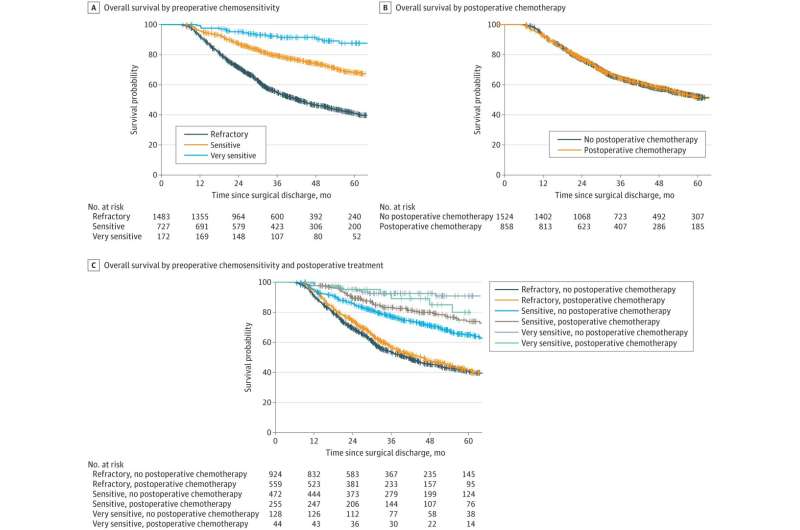Sensitivity to chemotherapy may guide treatment of patients with stomach cancer

A study led by scientists at Roswell Park Comprehensive Cancer Center shows that chemotherapy after surgery for gastric adenocarcinoma is significantly associated with longer survival in patients with chemosensitive disease, but not in those with very sensitive or refractory disease. These findings, which were recently published in the journal JAMA Network Open, suggest that assessing how responsive a tumor appears to be to treatment with chemotherapy before surgery can be used to guide decisions regarding postoperative chemotherapy, thereby personalizing treatment of patients with this type of stomach cancer.
"Many patients with gastric cancer who are eligible for surgical resection, or removal of stomach tissue, receive chemotherapy both before and after surgery to maximize their chance of survival," says first author Lei Deng, MD, a Hematology-Oncology Fellow at Roswell Park. "However, patients do not respond to chemotherapy equally. Some patients will have no cancer cells at the time of surgery or will learn that their tumors have shrunk, while others may be told that their tumors have stayed the same size or even grown larger."
To better understand these different responses to chemotherapy and ultimately determine whether a patient's response to chemotherapy before surgery can provide enough information to guide treatment decisions after surgery, the researchers examined data from 2,382 patients with clinical stage 2 or stage 3 gastric adenocarcinoma who were treated with preoperative chemotherapy and curative-intent resection—excluding radiation therapy. Data were pulled from the National Cancer Database, which covers more than 70 percent newly diagnosed gastric adenocarcinomas in the United States, for the period of 2006 to 2017.
Preoperative chemosensitivity was measured as the change in cancer stage before and after preoperative chemotherapy and surgery. While most patients (62 percent) had refractory disease, meaning that the cancer has stopped responding to treatment), 38 percent showed good responses to chemotherapy, indicating high preoperative chemosensitivity, with 31 percent showing sensitive disease, and 7 percent showing highly sensitive disease.
Most patients (64 percent) did not receive postoperative chemotherapy. The likelihood of receiving postoperative chemotherapy was significantly lower among patients who were older or had a comorbidity, longer time from chemotherapy initiation to surgery, less sensitivity to preoperative chemotherapy and longer hospitalization after surgery.
Overall, the researchers observed that preoperative chemosensitivity was significantly associated with a survival benefit from postoperative chemotherapy. Patients with sensitive disease who received postoperative chemotherapy lived longer than those who did not, with five-year survival rates of 73.8 percent and 65 percent, respectively. However, the researchers found no significant difference in survival among patients with very sensitive or refractory disease who were treated with postoperative chemotherapy compared to those who were not.
"In this national cohort of patients with clinical stage-two to stage-three gastric cancer, those with a residual but smaller tumors had better outcomes if they also received chemotherapy after surgery," says Sarbajit Mukherjee, MD, MS, Assistant Professor of Oncology at Roswell Park. "In contrast, two groups of patients appeared not to benefit from postoperative chemotherapy: those with tumors that were so sensitive to chemotherapy that they could not be found at the time of surgery, and those with tumors so resistant to treatment that they stayed the same size or even became larger."
The findings from this study suggest that preoperative chemosensitivity may provide useful information to help clinicians make decisions regarding postoperative treatment for patients with gastric cancer.
"If our results are validated in prospective studies, we would confidently provide postoperative chemotherapy for those who need it and avoid those who do not," says Dr. Mukherjee, who notes that further research is planned at Roswell Park to explore novel blood biomarkers for determining sensitivity earlier on in the course of chemotherapy.
More information: Lei Deng et al, Association of Preoperative Chemosensitivity With Postoperative Survival in Patients With Resected Gastric Adenocarcinoma, JAMA Network Open (2021). DOI: 10.1001/jamanetworkopen.2021.35340

















